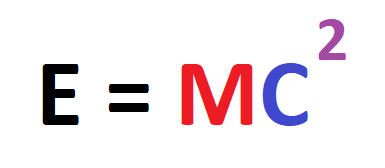IS EVERYTHING MADE OF ENERGY?
Is everything made of energy? Ever since the formation of quantum mechanics in the early 20th century, everyone from scientists to the clergy to the average person has an opinion on the subject and how it applies to the world. One of the frequently made claims is that everything is made of energy. This article will examine that idea and see if it holds true.
Is everything made of energy?: E=MC^2
The best place to start this discussion is the most famous equation in physics: E=mc^2. E stands for energy, m for mass, and c for the speed of light which is 3*108 m/s. Before Einstein derived this equation, mass and energy were seen as separate and distinct from each other. However, this equation showed that mass and energy are connected to each other. Einstein said in this clip “that mass and energy are both but different manifestations of the same thing”. In other words, mass and energy are two forms of one universal substance that makes up the material world. Why don’t we call this ‘existenceium’. (I know, it’s an eccentric label, but bear with me. At the very least you got your good laugh in for the day lol.) This is one consequence of the equation.
IS EVERYTHING MADE OF ENERGY?: sO, WHAT DOES THIS MEAN?
This means that mass can be converted into energy and vice versa. But how much does a small amount of matter have? Well, we can calculate that using the equation. Let’s say we have a small ball of mass = 1 kilogram (kg). Now let’s plug in our numbers to calculate the energy of this ball.
E=mc2= (1 kg) * (3*108 m/s) = 3*108 Joules (J) = 300000000 J = 300 MegaJoules (MJ).
As you can see, this is quite a lot of energy!!! A small amount of matter has an unfathomable amount of energy.
IS EVERYTHING MADE OF ENERGY?: TECHNICAL MATTERS
Note in the last sentence above I stated that matter HAS energy. Since they are both different forms of ‘existenceium’, it is technically incorrect. However, even though a lot of people will have issue with this technicality, I stand by this sentence. You see, in physics, definitions can oftentimes be nebulous and interchangeable. For instance, since quantum physics and quantum chemistry are very related to each other, sometimes a subject you think goes in quantum physics will be researched in the quantum chemistry domain. Another example is a quantum particle’s spin (which we’ll get into in a later post). Although a quantum particle does not spin per se, it has a behavior analogous to spin.
